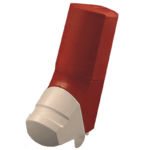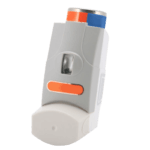Asthma
Asthma treatment, made convenient.
Secure delivery
UK clinicians
With asthma, getting ongoing care from a clinician isn’t always as convenient as it should be.
We’re here to change that. Talk to our experts about your asthma, order asthma treatment online and we’ll check in with you to see how you’re doing regularly.
Asthma is a condition which can be serious, and needs to be managed with the right medication. It’s a condition that affects the lungs, with swelling of the airways and tightness in the chest making it more difficult to breathe.
Minor cases can be a nuisance, but more severe cases may be life threatening. There’s currently no cure for it, but inhalers can prevent or relieve symptoms, so asthma can be well-managed without it affecting your life too much.
More than 8 million people in the UK have been diagnosed with asthma (so around 12% of the population), with approximately 5.4 million receiving treatment for it. So it’s fairly common.
Worldwide, it’s thought to affect more than 300 million people, and be prevalent in 4.5% of the global population. It’s more common in developed countries, but the prevalence of it is increasing in less developed countries too.
You’re more likely to get it as a child than during adulthood, but you can still develop it when you’re a bit older. It affects more boys than girls in early childhood, but this gender ratio switches amongst adults.
Some people grow out of asthma, but it’s normally a long-term condition if you get it as an adult.
Yes. There are several different forms of asthma that you can develop. Allergic asthma is caused by allergic reactions to specific substances. Adult-onset asthma first presents in adulthood, while childhood asthma occurs when you’re a child.
There’s also occupational asthma, which you can develop in the workplace (usually due to an allergy), and nocturnal asthma (which occurs at night). You can get acute or chronic asthma, seasonal asthma (which occurs at certain times of the year) and exercise-induced asthma too.
There’s a rare type of asthma called eosinophilic asthma, which is when your body produces too many white blood cells. Eosinophil counts measure the level of white blood cells in your body and can help monitor the condition.
Eosinophilic asthma usually starts in adults between the ages of 35 and 50. We’re still learning about the condition, but it can’t be easily treated with many of the usual medications. Corticosteroids seem to be the best treatment for most people.

How we source info.
When we present you with stats, data, opinion or a consensus, we’ll tell you where this came from. And we’ll only present data as clinically reliable if it’s come from a reputable source, such as a state or government-funded health body, a peer-reviewed medical journal, or a recognised analytics or data body. Read more in our editorial policy.
While we know what can trigger an attack, the root cause of asthma isn’t entirely clear.
Genetics, the environment, and the relationship between these two factors are thought to play a role. Asthma rates have also risen in urban areas in the past few decades, which has led some to suggest that air pollution may contribute towards it.
Respiratory infections and physical activity are also linked to asthma attacks, but ultimately the condition can be triggered by many factors which vary from one person to the next.
Moderate asthma symptoms include wheezing, coughing and chest tightness. These can be easily treated with the right medication. Severe asthma attack symptoms include being too breathless to speak, dizziness, blue fingers or lips and fainting.
It’s only when asthma symptoms develop into an asthma attack that you should seek immediate medical help, especially if you don’t have your treatment with you. Severe asthma flare-ups can be tackled with medication that eases symptoms very effectively. So in short - it’s important that you always have your asthma treatment with you.
Asthma’s a lifelong condition and there’s currently no cure. Thankfully, it can be well managed with easy-to-take medications that have few side effects. Mild symptoms may only last for a few minutes, whilst more severe symptoms can persist for longer.
Asthma breathing difficulties are the most likely symptoms, which can be alarming when they’re severe. But the good news is that there is medication that can get to work on these symptoms immediately.

How we source info.
When we present you with stats, data, opinion or a consensus, we’ll tell you where this came from. And we’ll only present data as clinically reliable if it’s come from a reputable source, such as a state or government-funded health body, a peer-reviewed medical journal, or a recognised analytics or data body. Read more in our editorial policy.

How we source info.
When we present you with stats, data, opinion or a consensus, we’ll tell you where this came from. And we’ll only present data as clinically reliable if it’s come from a reputable source, such as a state or government-funded health body, a peer-reviewed medical journal, or a recognised analytics or data body. Read more in our editorial policy.
Have something specific you want to know? Search our info below, or ask our experts a question if you can’t find what you’re looking for.
Global asthma prevalence in adults: findings from the cross-sectional world health survey. BMC Public Health, 12(1).
Mometasone or Tiotropium in Mild Asthma with a Low Sputum Eosinophil Level. The New England Journal of Medicine. USA. Nejm Group.
Is asthma prevalence still increasing? Expert review of respiratory medicine, 10(1), pp.39–51
Leveraging -omics for asthma endotyping. The Journal of Allergy and Clinical Immunology, 144(1), pp.13–23.
Comparison of asthma prevalence in the ISAAC and the ECRHS. ISAAC Steering Committee and the European Community Respiratory Health Survey. International Study of Asthma and Allergies in Childhood. European Respiratory Journal, 16(3), pp.420–426.
Respiratory symptoms and peak expiratory flow in children with asthma in relation to volatile organic compounds in exhaled breath and ambient air. Journal of Exposure Science & Environmental Epidemiology, 13(5), pp.348–363.

Widely used asthma reliever medication. Provides instant relief from asthma symptoms.

One a day preventative asthma tablets. Generic version of Singulair.

An inhaler that delivers prevention medication directly to your lungs to help manage your asthma.

A preventer inhaler for severe asthma to help you breathe easier and reduce inflammation.

A combination asthma inhaler that keeps your airways open and reduces irritation.

Keep your asthma or COPD under control with combined long-term relief and prevention.

A daily preventer inhaler that controls asthma symptoms. Available in 3 different strengths.

A shake-and-click preventer inhaler for easy asthma management.

Asthma and COPD prevention and relief in a dry powder inhaler.

Daily combination inhaler for asthma and COPD that works for up to 12 hours.

An easy-to-use preventer inhaler for long term asthma symptoms.

Registered with GMC (No. 4624794)
Meet Daniel
Registered with GPhC (No. 2202465)
Meet Sanjeda
Registered with GPhC (No. 2070724)
Meet Craig
Always read the leaflet that comes with your medication and tell us about any side effects you get.
We know health, but you know you.
Our experts tell you what’s safe, but you decide what’s best.
Answer a few questions and tell us about yourself. Get tailored advice from our clinicians so you can choose better.

Choose your treatment and how often you have it delivered.

We know things change. It’s the nature of life. We’ll check in regularly to make sure your treatment is still right for you.
Pause. Change. Skip. Start again. Any time you like.
Here are some other things we can help with.
Choose from our range of tablets and solutions. Get ongoing care and support from our experts.
Stop smoking treatments that can help you kick the habit forever, and reduce your risk of disease.
Tablets or injections. Tailored weight loss treatments combined with ongoing support from our experts.
All the info related to asthma you could ever need.
Take a look at our health guides.

Asthma inhalers come in lots of colours. However, the most memorable tend to be the brown and blue ones, probably because they are prescribed more frequently. People often refer to their inhalers by the colour instead of their name, as it can be easier to do so. But what do the colours actually mean and how reliable are they as a guide?
Read more
By following your asthma action plan you’ll lower the chances of worsening your condition. Asthma can be debilitating, but having a set plan to follow helps you to have more control over your life and your condition.
Read more
Knowing the signs of an asthma attack and what to do is really important if you or someone you know suffers from asthma. It could save a life.
Read moreWe're making healthcare more about you. Sign up to our newsletter for personalised health articles that make a difference.
Disclaimer: The information provided on this page is not a substitute for professional medical advice, diagnosis, or treatment. If you have any questions or concerns about your health, please talk to a doctor.
We couldn't find what you're looking for.
Here's everything we treat. Or, if you're looking for something we don't have yet, you can suggest something.
If there’s a particular treatment or condition you’re looking for, tell us and we’ll look into it for you.
Submit your question here, or tell us if you’ve found an issue on our site.
We’ll get back to you very soon. We aim to respond to all queries in one working day.
You’re signed up to our newsletter. Keep an eye on your inbox for our latest update.
By clicking 'Subscribe now' you're agreeing to our Privacy Policy.
We’ve sent you an email asking you to confirm your email address.